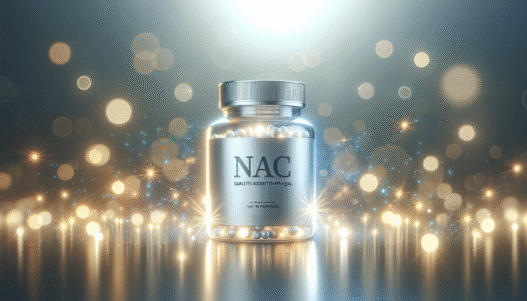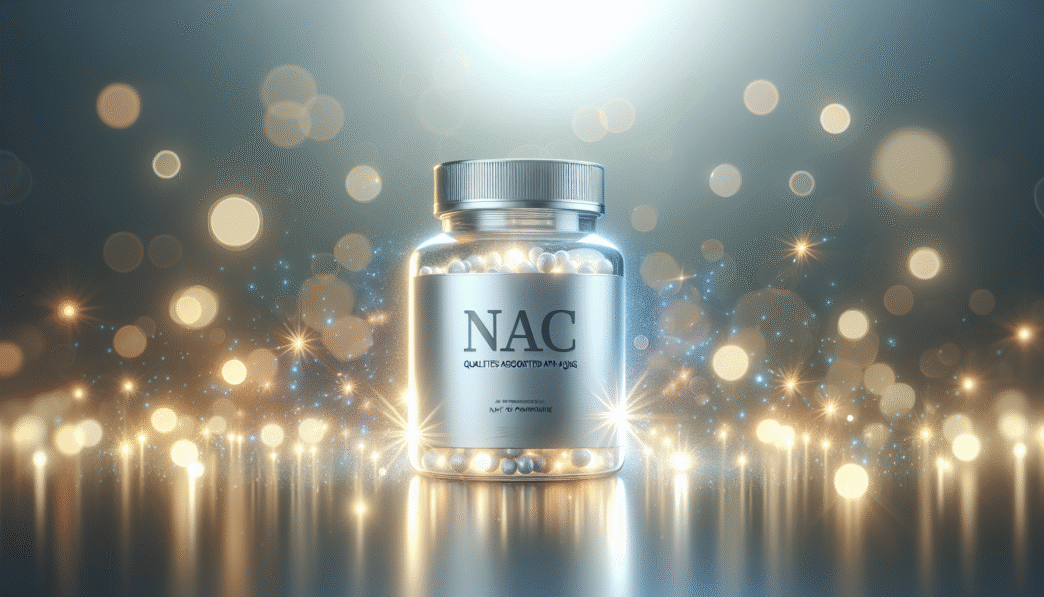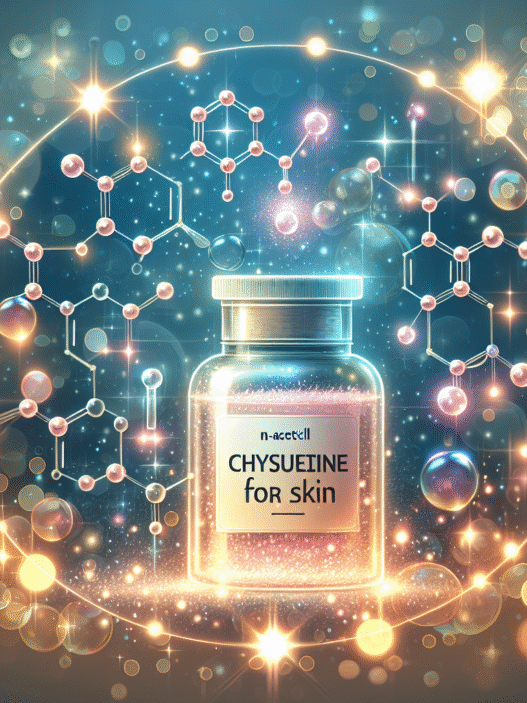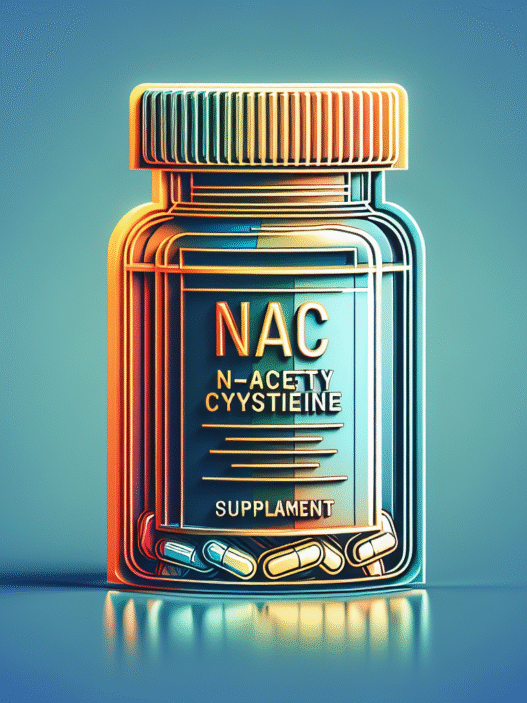Understanding NAC Supplement
What is NAC?
NAC, or N-acetylcysteine, is a supplement derived from the amino acid cysteine. This compound is recognized for its potent antioxidant and anti-inflammatory properties. As an effective antioxidant, NAC helps the body produce glutathione, a vital detoxifier that combats oxidative stress. This oxidative stress contributes to aging and various health conditions, including heart disease, diabetes, and infertility (WebMD). While the benefits of NAC are well-documented, its effectiveness in increasing blood glutathione levels has shown mixed results in some studies, prompting cautious recommendations regarding its use for aging (InsideTracker).
How Does NAC Work?
NAC works by enhancing the body’s natural ability to produce glutathione. Glutathione plays a critical role in neutralizing harmful free radicals, also known as reactive oxygen species (ROS), which are linked to cellular damage. By reducing oxidative stress, NAC may help prevent or alleviate certain health concerns associated with aging, making it a point of interest for longevity seekers.
The antioxidant properties of NAC not only help reduce oxidative stress but may also support immune function and improve various cellular processes. Additionally, NAC has demonstrated effectiveness in treating acetaminophen overdose, as it boosts glutathione levels to expedite the breakdown of the substance, thereby preventing potential liver or kidney damage (WebMD).
By incorporating NAC into a health regimen, individuals concerned about liver health or detoxification can potentially harness its protective properties. For further information on the benefits of NAC, refer to resources such as n-acetyl cysteine benefits and nac supplement benefits.
Health Benefits of NAC
N-Acetyl Cysteine (NAC) is gaining attention for its numerous health benefits, particularly related to its anti-aging properties. The benefits of NAC extend beyond traditional uses, encompassing various aspects of health and well-being.
Antioxidant Properties
One of the primary benefits of NAC is its role as a powerful antioxidant. NAC helps the body produce glutathione, a potent antioxidant that neutralizes cell-damaging free radicals. This action lowers the risk of various health conditions, including heart disease and diabetes (WebMD). The antioxidant properties of NAC can also contribute to reducing inflammation and oxidative stress in the body, making it a valuable supplement for longevity seekers.
| Property | Effect |
|---|---|
| Antioxidant | Reduces cell damage |
| Anti-inflammatory | Lowers inflammation |
| Disease prevention | Decreases risk of chronic diseases |
Potential Disease Prevention
NAC’s potential in disease prevention is significant. Studies indicate that NAC may reduce the burden of various health issues, such as insulin resistance, and improve fat tissue function, particularly in obesity-related health problems (WebMD). Specifically, NAC has been studied for its effects on conditions like polycystic ovary syndrome (PCOS) and may benefit fertility by improving semen quality and ovulation regularity.
Support for Detoxification
Another critical benefit of NAC is its support for detoxification processes in the body. NAC plays a vital role in helping the liver detoxify harmful substances. It is particularly known for its use in mitigating acetaminophen overdose, where it helps replenish glutathione levels and protect the liver from damage. This detoxifying ability makes NAC a popular supplement among those concerned with liver health and overall detoxification.
| Detoxification Benefit | Mechanism |
|---|---|
| Liver protection | Replenishes glutathione |
| Enhances detoxification | Neutralizes toxins |
NAC supplements promote not only liver health but also broader health benefits that may contribute to longevity. People considering NAC for its anti-aging properties can explore its full range of effects, particularly those related to n-acetyl cysteine benefits.
NAC for Liver Health
Impact on Liver Function
N-Acetyl Cysteine (NAC) is acknowledged for its role in liver health. It is known to help lower inflammation and oxidative stress, enhancing overall liver function (WebMD). By improving fat tissue function, NAC can also alleviate certain obesity-related health problems. Its antioxidant properties contribute significantly to maintaining healthy liver functions, ensuring that the liver effectively processes and detoxifies harmful substances.
NAC supports the synthesis of glutathione, a crucial antioxidant produced by the liver. By increasing glutathione levels, NAC aids in combating oxidative stress, which is vital for liver health and function. Regular supplementation may benefit individuals aiming to promote liver health and longevity.
| Benefit | Description |
|---|---|
| Reduces inflammation | Lowers liver inflammation and oxidative stress |
| Enhances detoxification | Assists in detoxifying harmful substances |
| Supports glutathione synthesis | Helps increase levels of this vital antioxidant |
For those interested in the broader implications of NAC, including its interactions with aging processes, more information can be found in our article on nac for anti-aging.
Treatment of Acetaminophen Overdose
NAC is particularly important in emergency medicine for its efficacy in treating acetaminophen overdose. When administered, it works by replenishing glutathione levels, which are depleted when the liver processes excessive acetaminophen. This replenishment helps break down acetaminophen faster, potentially preventing severe liver or kidney damage if treated within 8 to 10 hours of the overdose event (WebMD).
In clinical practice, NAC can be given orally or intravenously, with the latter often reserved for severe cases. When treating acetaminophen overdose, timely intervention with NAC can significantly enhance recovery outcomes and mitigate potential long-term liver damage.
| Administration Method | Time Frame for Effectiveness | Risk of Liver Damage |
|---|---|---|
| Oral | Within 8-10 hours | High if untreated |
| Intravenous | Within 8-10 hours | High if untreated |
Understanding the significance of NAC in liver health highlights its potential for promoting longevity and preventing damage. For additional insights into the health benefits of NAC, consider exploring our content on n-acetyl cysteine benefits.
NAC and Respiratory Health
N-Acetyl Cysteine (NAC) is increasingly recognized for its potential benefits in supporting respiratory health. This supplement is known for its antioxidant properties, which may play a crucial role in enhancing lung function and managing various lung conditions.
Improving Lung Function
NAC is being researched for its ability to improve lung function, particularly in individuals suffering from chronic obstructive pulmonary disease (COPD) and other chronic lung diseases. Studies suggest that high doses of NAC (around 1,200 milligrams per day) can lower inflammation, break up biofilms, and reduce oxidative stress in the lungs WebMD.
The effectiveness of NAC in improving lung function can be attributed to its role in enhancing the production of glutathione, an important antioxidant that helps protect the lungs from damage and supports overall respiratory health. Regular supplementation may lead to fewer flare-ups and a reduction in symptoms like wheezing and coughing in patients with bronchitis.
| Parameter | Effect of NAC |
|---|---|
| Lung Inflammation | Decreases |
| Oxidative Stress | Reduces |
| Frequency of Flare-ups | Lessens |
| Wheezing Severity | Decreases |
Benefits for Lung Conditions
NAC’s benefits extend to various lung conditions, including asthma, bronchitis, and cystic fibrosis. Research indicates that NAC may help manage symptoms by lessening inflammation in the airways, thereby improving airflow and lung function WebMD.
In addition to its anti-inflammatory properties, NAC may also assist in thinning mucus, which can be particularly beneficial for individuals with cystic fibrosis. By making mucus less viscous, NAC helps clear the airways, thus facilitating easier breathing and significant relief from respiratory distress.
The following table summarizes some of the key lung conditions where NAC might provide benefits:
| Lung Condition | Potential Benefits of NAC |
|---|---|
| Chronic Obstructive Pulmonary Disease (COPD) | Reduces inflammation and flare-ups |
| Bronchitis | Lessens wheezing and coughing severity |
| Asthma | May improve airway function |
| Cystic Fibrosis | Aids in mucus clearance |
For those concerned about lung health or seeking to enhance their respiratory function through supplementation, NAC is an increasingly favored option. Individuals interested in learning about the broader benefits of NAC can explore our section on n-acetyl cysteine benefits and its role in overall health.
NAC for Fertility and Hormonal Balance
N-Acetyl Cysteine (NAC) has garnered attention for its potential benefits in fertility and hormonal balance. Research indicates that this powerful supplement may help enhance reproductive health for both men and women.
Effects on Fertility
NAC shows promising evidence of improving fertility in both genders. In men, studies have demonstrated improvements in semen quality, which can be crucial for those experiencing infertility. In women, NAC may assist with ovulation regularity, particularly for those who suffer from conditions like polycystic ovary syndrome (PCOS) that often disrupt normal ovulation patterns.
| Fertility Aspect | Effect of NAC |
|---|---|
| Semen Quality (Men) | Improvement noted |
| Ovulation Regularity (Women) | Support for regular cycles |
| Conditions Addressed | PCOS and related infertility issues |
Hormonal Balance Support
Beyond its role in fertility, NAC may also contribute to overall hormonal balance. Because it aids in reducing oxidative stress, NAC can help regulate hormone levels, making it beneficial for individuals facing hormonal imbalances. This can be particularly advantageous for those whose hormone levels fluctuate due to stress, diet, or environmental factors.
Maintaining hormonal balance is essential for overall health and can lead to improved mood, energy levels, and reproductive function. For those interested in optimizing their health, incorporating NAC into their regimen may offer significant support.
For a deeper look into the comprehensive benefits of NAC, explore our articles on n-acetyl cysteine benefits and nac supplement benefits.
NAC Usage and Administration
Forms of Administration
N-Acetyl Cysteine (NAC) can be administered in various forms, catering to different needs and preferences. The primary methods include:
-
Oral Administration: This is the most common method where NAC is taken in capsule or powder form. Oral intake is generally well-tolerated and convenient for regular use.
-
Intravenous (IV) Administration: NAC can also be delivered intravenously, which may be preferred in clinical settings for rapid absorption. This method may lead to more pronounced adverse reactions compared to oral intake.
-
Inhalation: Inhaled NAC is used primarily for respiratory conditions, allowing direct delivery to the lungs.
Despite these options, some side effects may occur from NAC usage, including gastrointestinal symptoms, nausea, vomiting, itching, and erythema. Adverse effects are typically mild, but individuals should be mindful of their response to different administration methods (PubMed Central).
| Administration Method | Description | Common Side Effects |
|---|---|---|
| Oral | Taken as capsules or powder | Mild gastrointestinal issues, nausea |
| IV | Rapid absorption in clinical settings | More pronounced adverse reactions |
| Inhalation | Delivery directly to the lungs | Generally well-tolerated |
Side Effects and Considerations
The usage of NAC may come with certain side effects and considerations that users should be aware of:
- Side effects may include mild gastrointestinal symptoms such as nausea, vomiting, and skin irritation. These effects are generally not severe.
- The bioavailability of free NAC is low (<10%), meaning that only a small percentage reaches the plasma and tissues. Upon administration, NAC primarily metabolizes into cysteine and glutathione.
- After intravenous administration at a dose of 150 mg/kg, the maximum plasma concentration recorded was around 554 mg/L, with a total clearance of 0.33 to 0.47 L/kg for NAC (PubMed Central).
Individuals considering NAC as an anti-aging supplement or for other health benefits should consult with a healthcare provider to determine the most appropriate form and dosage based on their specific needs. For more detailed information on dosage guidelines, visit our article on n-acetyl cysteine dosage.





















